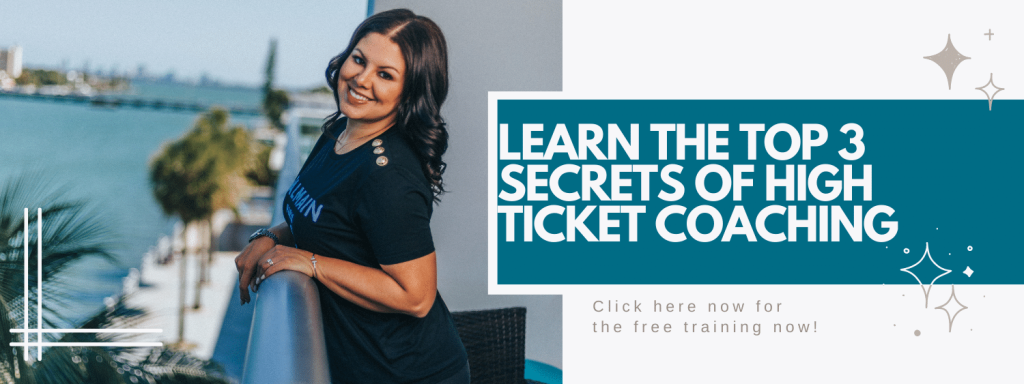
This post is all about life coaching tools.
Life Coaching Tools
Life coaching is a process that helps individuals to identify and achieve their personal and professional goals.
Not only do I believe in it after supporting clients with business and life coaching in over 20 countries but I have also benefited from life coaching myself.
Without life coaching or life coaching tools it would have felt impossible to coordinate our business success, have a multi-million dollar launch, plan events, and more while my dad was losing his battle to lung cancer.
There isn’t enough success in the world to shield us from stressors but we can prepare with coping tools and by building out our capacity to handle what comes our way.
Whatever you are going through, remember that you this!
Thankfully, there are several essential life coaching tools that can help maximize one’s potential and bring about positive changes in life.
Self-reflection as a life coaching tool:
Self-reflection involves taking time to reflect on your thoughts, feelings, behaviors, and experiences. This can help you to gain deeper insight into yourself, identify areas for improvement, and develop self-awareness.
When done regularly, self-reflection can help you to make positive changes in your life, increase self-confidence, and improve relationships with others.
Here is a list of 30 questions that can be used as a self-reflection tool in life coaching:
- What are my core values?
- What are my current strengths and weaknesses?
- What are my priorities in life?
- What are my aspirations and long-term goals?
- What do I want to achieve in the next 6 months?
- What do I want to achieve in the next year?
- What do I want to achieve in the next 5 years?
- What am I grateful for in my life?
- What are the things that bring me the most joy and fulfillment?
- What are the things that bring me the most stress and dissatisfaction?
- What are my biggest fears and insecurities?
- What are my personal and professional relationships like?
- What is my current financial situation?
- What is my work-life balance like?
- What is my level of self-esteem and confidence?
- What are my communication styles and how can they be improved?
- What are my coping mechanisms and how can they be improved?
- What are my stress triggers and how can they be managed?
- What are my physical and mental health like?
- What are my hobbies and interests?
- What are my personal growth and development areas?
- What are my spiritual beliefs and practices?
- What is my personal brand and how can it be improved?
- What are my decision-making processes and how can they be improved?
- What are my time management skills and how can they be improved?
- What are my leadership skills and how can they be improved?
- What are my teamwork and collaboration skills and how can they be improved?
- What are my negotiation and conflict resolution skills and how can they be improved?
- What are my creative skills and how can they be improved?
- What is my overall satisfaction with life and what changes can be made to improve it?
By regularly reflecting on these questions, you can gain deeper insight into yourself, identify areas for improvement, and develop a roadmap for personal growth and fulfillment.
Goal-setting as a life coaching tool:
Setting clear and specific goals is an important aspect of life coaching.
By setting goals, you are able to provide direction and focus for your journey towards personal growth and fulfillment. When setting goals, it is important to consider your values, priorities, and aspirations.
You should also make sure your goals are realistic, achievable, and measurable.
Here are 10 prompts to help with goal setting as a life coaching tool:
- What is my ultimate vision for my life?
- What are my long-term aspirations and dreams?
- What are my priorities for the next 6 months?
- What are my priorities for the next year?
- What are my priorities for the next 5 years?
- What are my values and how do they relate to my goals?
- What are the obstacles that may prevent me from reaching my goals?
- What support and resources do I need to achieve my goals?
- What are the benefits and rewards of achieving my goals?
- How will I measure my progress towards my goals and celebrate my achievements?
By reflecting on these prompts, you can clarify your goals, identify your priorities, and develop a roadmap for success.
You can also evaluate your progress towards your goals and make adjustments as needed, which can help to increase motivation and bring about positive changes in your life.
Action planning as a life coaching tool:
Once you have set your goals, it is important to create an action plan to help you achieve them. This involves breaking down your goals into smaller, achievable tasks and setting deadlines for each.
Action planning helps to make your goals more manageable, and provides you with a clear roadmap for reaching them.
This can increase motivation and improve your chances of success.
Click here to learn more about life coaching marketing.
Affirmations as a life coaching tool:
Positive affirmations are short, powerful statements that can help to boost your confidence, change limiting beliefs, and increase motivation towards your goals.
Affirmations work by re-programming your mind with positive and empowering beliefs, and can be used to counteract negative self-talk and increase self-esteem.
Here are 37 positive affirmations that can be used as a life coaching tool:
- I am worthy of love, happiness, and success.
- I am capable of overcoming any obstacle and achieving my goals.
- I am strong and resilient.
- I am worthy of abundance in all areas of my life.
- I am confident and self-assured.
- I am deserving of respect and kindness from others.
- I am worthy of making a positive impact on the world.
- I am grateful for all that I have and all that I am.
- I am in control of my thoughts, emotions, and actions.
- I am deserving of success in my personal and professional life.
- I am worthy of a fulfilling and meaningful life.
- I am open to new opportunities and experiences.
- I am deserving of love and happiness in my relationships.
- I am deserving of financial abundance and security.
- I am capable of making positive changes in my life.
- I am deserving of good health and well-being.
- I am confident in my abilities and my potential.
- I am deserving of peace and contentment.
- I am worthy of happiness and fulfillment in my work.
- I am capable of overcoming my fears and doubts.
- I am deserving of a positive self-image and self-esteem.
- I am deserving of love and support from others.
- I am capable of creating the life I want.
- I am deserving of a balanced and fulfilling life.
- I am deserving of a strong and loving community.
- I am worthy of financial freedom and independence.
- I am deserving of a successful and meaningful career.
- I am capable of living my life with purpose and intention.
- I am deserving of happiness and peace in my relationships.
- I am capable of making a difference in the world.
- I am deserving of a life full of adventure and excitement.
- I am capable of reaching my full potential.
- I am deserving of good health and vitality.
- I am worthy of love and compassion for myself.
- I am deserving of a life free of stress and worry.
- I am capable of overcoming adversity and rising to challenges.
- I am deserving of a life filled with joy and fulfillment.
By repeating these affirmations regularly, you can shift your mindset and cultivate a more positive and optimistic outlook.
This can help you to overcome negative thoughts, increase self-confidence, and create a more fulfilling life for yourself.
Mindfulness as a life coaching tool:
Mindfulness involves being present in the moment and focusing on your thoughts, emotions, and experiences.
This can help to reduce stress, improve well-being, and increase focus and clarity.
Regular mindfulness practices, such as meditation and yoga, can help to improve mental and physical health and bring greater peace and contentment to your life.
Click here for additional essentials on motivation.
Journaling as a life coaching tool:
Journaling is a form of self-expression that involves writing down your thoughts and experiences.
This can be a helpful tool for self-reflection and goal-setting, as it provides a record of your journey and can help you to identify patterns and areas for improvement.
Writing down your thoughts can also be therapeutic and can help to relieve stress and increase self-awareness.
Here are 27 prompts for journaling as a life coaching tool:
- What are my current thoughts and emotions?
- What are my biggest goals and aspirations?
- What are my priorities in life?
- What are my strengths and weaknesses?
- What are my values and how do they impact my life?
- What are my biggest challenges and how can I overcome them?
- What is causing me stress and how can I manage it?
- What are my successes and failures and what can I learn from them?
- What are my relationships like and how can I improve them?
- What are my personal and professional goals for the next 6 months?
- What are my personal and professional goals for the next year?
- What are my personal and professional goals for the next 5 years?
- How can I achieve balance in my life?
- What are my habits and how can I improve them?
- How can I increase my self-confidence and self-esteem?
- How can I develop a positive mindset and outlook?
- What are my biggest fears and how can I overcome them?
- How can I increase my resilience and mental toughness?
- How can I cultivate a more fulfilling and meaningful life?
- How can I increase my happiness and overall well-being?
- How can I develop stronger relationships with others?
- What are my personal and professional goals for the next decade?
- How can I develop a more fulfilling career?
- What are my financial goals and how can I achieve them?
- What are my health and wellness goals and how can I achieve them?
- How can I make a positive impact on the world?
- What is my ultimate vision for my life and how can I work towards it?
By journaling regularly, you can reflect on your thoughts and emotions, identify your goals and priorities, and develop a plan for success.
You can also track your progress, reflect on your growth, and celebrate your achievements, which can help to increase motivation and bring about positive changes in your life.
Visualization as a life coaching tool:
Visualization involves creating a mental image of yourself achieving your goals. This can help to increase motivation, reduce stress, and improve focus and clarity.
When you visualize yourself achieving your goals, you are programming your mind with positive and empowering beliefs, and strengthening your determination and confidence.
This can help to increase your chances of success and bring about positive changes in your life.
Overall, life coaching tools such as self-reflection, goal-setting, action planning, affirmations, mindfulness, journaling, and visualization are essential tools that can help to maximize your potential and bring about positive changes in your life.
By utilizing these tools, you can support yourself in reaching your full potential and achieve your goals.
This post was all about life coaching tools.








